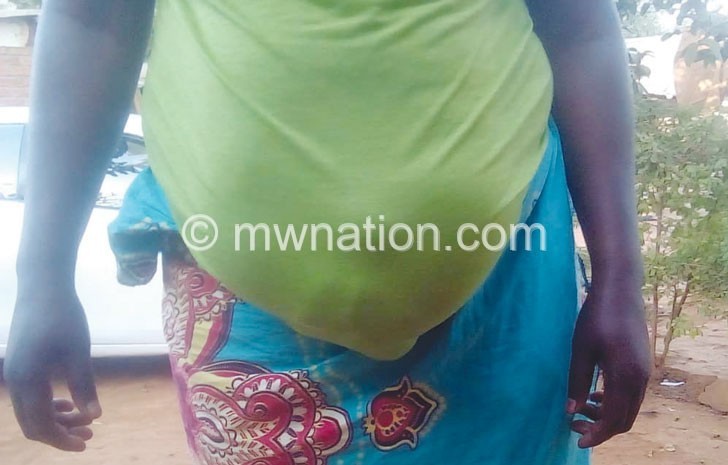Medical procedure leaves Zomba mother deformed
After enduring the physical strain of carrying a baby for nine months and the emotional twists resulting from hormonal imbalance, the joy of child-bearing has turned into a nightmare for a Zomba woman.
Thirty-five-year-old Stella Chinjati has now been left in pain, public shame and a deformed tummy following a caeserian operation she underwent at Zomba Central Hospital in November 2018 went wrong.

Chinjati, from Mbengule Village under Traditional Authority (T/A) Mlumbe in Zomba delivered through a caesarian procedure, but her wound had to be re-dressed three times after delivery following the snapping of sutures before her tummy started protruding and sagging, forming a lump that doctors at the hospital have not corrected.
As a result, the woman cannot walk long distances, has problems to nurse her baby and cannot put on dresses or skirts like fellow women, only relying on wrappers to cover her up.
The story of Chinjati’s nightmare is now subject of a Medical Council of Malawi (MCM) investigation, highlighting challenges that expectant mothers face across the country as they seek to comply with government’s policy of delivering at registered health facilities instead of traditional birth attendants (TBAs). Government banned TBAs in 2007.
In an interview from her home, the mother of three said her life was punctuated by pricking pains, itching and public shame due to the deformity which she tried several times to be corrected at the hospital, only to be greeted by a ‘come back later response’.
“The problem started before I was discharged. I duly alerted the doctors of my condition when some stitches snapped but despite having them amended they kept on getting loose. After that then my tummy would not return to its normal size. It protruded and sagged, but all I was told was that the hospital had no [surgical] mesh to correct my condition,” she said.
The woman, who struggles to raise money to travel to the hospital together with her escorts, said she has given up on any hope of being assisted after several unsuccessful trips to the hospital where she was told that she would only be assisted once the equipment were sourced.
When asked to explain what went wrong in the medical procedure, principal administrator for the hospital, Anthony Kamanga, said the hospital is handling the matter and that it plans to bring Chinjati to the hospital for specialist treatment.
“We managed to identify the person who handled that case and established that when the problem was identified, the patient would not be seen by an expert during her quest to be treated for her recurring problem. We, therefore, made efforts to find out what needs to be done. Therefore, the patient will be asked to come back so that experts can address her problem,” he said.
MCM registrar Richard Ndovi said in an interview last week the council will institute investigations into the matter which he described as peculiar.
“If it were a question of inadequacy in equipment or materials to do a proper surgical procedure, there are always agreements with fellow hospitals such as Queen Elizabeth Central Hospital to assist each other with resources. We will dispatch a team to investigate the matter,” he said.
But in a written response, Ministry of Health spokesperson Joshua Malango said the ministry would wait for a determination from MCM to establish whether the matter is a case of negligence.
Malango said: “In order to ensure efficiency in public health down several measures, including plans to introduce hospital boards to provide oversight for central hospitals. We are also increasing number of staff and procurement of equipment for public health facilities.”facilities, the ministry has put
Malawi Health Equity Network executive director George Jobe said negligence by staff was costing the country’s chances of meeting its overall health goals.
“As a country, we are promoting safe motherhood and such incidents are likely to discourage some women from using recommended facilities. In a case like this one, stakeholders such as the ministry and MCM should show resilience to probe and punish if applicable, the culprits. They should also ensure that the patient is compensated in case of permanent disabilities,” he said
Health activist Dorothy Ngoma in a telephone interview last week described the Zomba case as a tip of an iceberg.
“We know that health workers are working under deplorable conditions where they do not have enough tools for their work. But such cases might also arise from negligence such that authorities need to get to the bottom of the matter to establish what really happened. Otherwise the life of the woman has been shattered when there could have been ways to assist her,” she said.
In July 2018, the Ministry of Health in conjunction with the office of the Ombudsman, launched the hospital ombudsman concept to ensure improved health service delivery in health facilities across the country.





